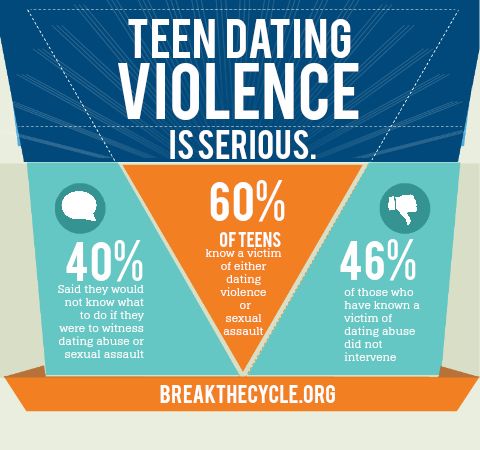February is Teen Dating Violence Awareness Month. 1 in 3 young people will be in an abusive relationship, and 33% of those will not tell anyone about their abusive relationship. This month is to raise awareness of dating violence in any age, and to prevent it.
Let’s talk about dating violence.
Dating violence happens to college age students, as well as to teens and adults. Dating violence is characterized by controlling or abusive behaviors by a current or ex dating partner.
Many people may not be able to recognize when they are in an abusive relationship, especially since abusive behaviors are romanticized in popular culture. Society and the media give us the wrong message about what to expect from relationships, and what is actually abusive versus romantic. Teens who are victims of dating violence in their youth are at a higher risk for victimization during college.
Let’s get into some examples:
What if Sean wants Shelby to give him her social media passwords and asks her to not speak to her guy friends anymore? Some people might say that shows how serious is about her. However, this is actually controlling behavior.
What if Maggie demands Katie text her every night to make sure she is home? While some would say that Maggie fears for Katie’s safety, this can actually turn into abusive and controlling behavior.
What if Ben repeatedly calls Carrie a “bitch” and when someone calls him out, he says “oh I’m just kidding!” Some would call it playful, and a joke, but it is actually abusive.
Name calling, yelling, threatening, using words to gain power and control over your significant other, hurting their self-esteem and emotional health, or any other kind of pattern is abusive. If the abuser wants their partner to abandon or neglect relationships with their loved ones, that is abuse. If the abuser tracks their victim’s actions, conversations, and takes up all their time so they cannot be with others, that is abuse.
College dating violence statistics (Breakthecycle.org)
- 43% of dating college women report experiencing some violent and abusive dating behaviors including physical, sexual, tech, verbal or controlling abuse.
- 52% of college women report knowing a friend who has experienced violent and abusive dating behaviors including physical, sexual, tech, verbal or controlling abuse.
- 58% of college students say they don’t know how what to do to help someone who is a victim of dating abuse.
- More than half of all college students (57%) say it is difficult to identify dating abuse.
Work to prevent dating violence
The first step is to create a discussion about dating violence among all young adults. Bring people together in the community, and talk about it. Spread the facts and information, and let your friends know their resources, and where they can go for support.
Get involved on campus to prevent GBV:
To get involved in the RE Initiative, find out more about becoming a peer advocate, or a peer educator, call the WSU 24/7 GBV Help Line at 507.457.5610 or email the Gender-Based Violence Prevention & Intervention Coordinator at hg*****@****na.edu.
Confidential Resources for Survivors:
- If you want to speak to an advocate, call the 24/7 GBV Helpline at 507.457.5610
- Off campus confidential Women’s Resource Center 24 Hour Crisis Line: 507.452.4453
- Check out www.winona.edu/RE
SaveSaveSaveSave

